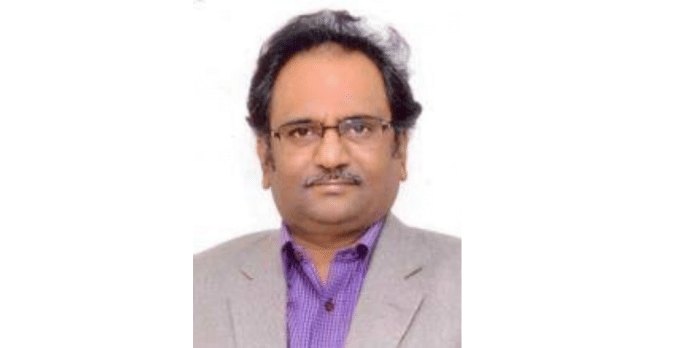Sridhar Acharyulu is the one who allowed inspection of DU records for 1978 (year Modi is believed to have graduated) and brought BCCI under RTI.
New Delhi: From allowing the inspection of Delhi University’s B.A. degree records for the year PM Narendra Modi ostensibly graduated to recently bringing the MP Local Area Development Scheme (MPLADS) under the ambit of RTI — some of the most controversial and landmark orders from the Central Information Commission (CIC) have one thing in common: Information Commissioner Sridhar Acharyulu.
A professor of law by profession, Acharyulu calls himself a “permanent minority” in the commission.
And a minority voice he is: When the government sought to recently amend the RTI Act, in what many saw as an attempt to dilute the 13-year-old regulation, Acharyulu was the only commissioner to publicly speak up against the move.
Also read: It’s duty of Central govt to explain how PM Lal Bahadur Shastri died: Information panel
“I still believe the draft amendment should be withdrawn… It is not in the interest of constitutional democracy, of the rule of law, and of RTI,” he told ThePrint.
“They want to change the status and salary of the commissioners… I don’t want the status, but if my rank is not above that of the cabinet secretary, how do I give him directions,” he asked.
Paying the price for it
It is not as though Acharyulu has not been penalised for speaking up. Barely two days after he passed the order allowing inspection of DU’s 1978 B.A. degree records, he was stripped of the charge of the Ministry of Human Resource Development (HRD). In an unexplained order, Chief Information Commissioner (CIC) R.K. Mathur simply said that another information commissioner will look into all complaints and appeals related to HRD.
Asked if he saw the move as evidence of political interference in the commission, Acharyulu said: “The person who made the change should be asked the question. I am not going to say anything about the case until I’m in this position.”
Acharyulu, along with three other commissioners, including Mathur, is set to retire in November. While the commission is struggling with vacancies even now — it is four commissioners short of the total sanctioned strength of 11 — the upcoming retirements will leave only three commissioners and no chief.
While even Mathur has expressed his displeasure over the vacancies — he directed the PMO earlier this year to reveal the reasons behind not filling the vacancies — Acharyulu has done so publicly and frequently.
“Not filling vacancies is like striking at the heart of the (RTI) Act,” he said.
Activism within government?
RTI activist Anjali Bhardwaj said “through his orders and otherwise, Professor Acharyulu is someone who has spoken his mind, and has not been afraid to do so”.
That comes across in his bold orders — recently, he brought the Board of Control for Cricket in India (BCCI) under the ambit of the RTI Act, directed the government to explain how former PM Lal Bahadur Shastri died, brought MPLADS under the ambit of RTI — stressing that an MP is a public authority — and asked the government to clarify whether the Taj Mahal is a mausoleum or temple.
Yet, the boldness of his orders, which activists admire him for, make him “a permanent minority” in the commission.
“One cannot be an activist when in government,” a CIC official said, on the condition of anonymity. “His orders often get struck down in courts and that is an embarrassment for the commission.”
In 2015, for example, the Delhi High Court stayed his order directing the Lieutenant-Governor’s secretariat to disclose communications made between the L-G and Delhi chief minister Arvind Kejriwal.
“The job of the commission is to say whether something comes under the RTI Act or not, but he often transgresses that boundary,” the official alleged.
However, Bhardwaj argues that orders that are inconvenient for the government often get challenged in courts. “That doesn’t make his order bad in law,” she said.
One rank, different pension
If, for the rest of the commission, Acharyulu’s credentials as an academic impede him from working like a government authority, the law professor and author of over 28 books on law and journalism too is aware of being in minority in the commission.
While the six other serving commissioners are all retired bureaucrats, Acharyulu is the lone academician in the commission.
“According to the RTI Act, the government should appoint persons from eight fields, but they don’t do that…They are all from management or administration, I’m all alone. Shouldn’t the commission represent all walks of life and not just retired government servants?” he asked.
Also read: A political dynasty that no one talks about, but it spans three generations & four parties
Having not been a civil servant will reflect in Acharyulu’s pension post-retirement as well. “All the others will be given some Rs 1.5 lakh, and I’ll be given Rs 18,000 or 19,000 because I didn’t hold a pensionable job prior to this,” he said.
“I will write books and survive. But what happens to ‘one rank one pension’ here? Shouldn’t the government protect the dignity of the commissioner after he ceases to be in office?” he asked.







I have listened to his speech.He is a logical thinker